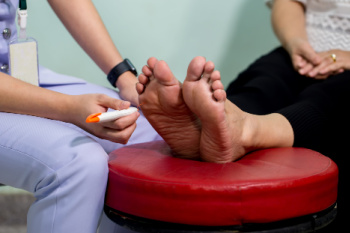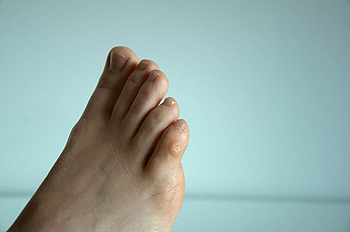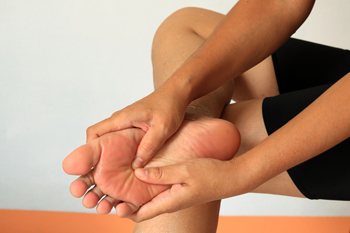 Diabetic neuropathy is a complication of diabetes that occurs when high blood sugar levels cause damage to nerve fibers. The nerves in the legs and feet are primarily affected. This can lead to symptoms such as numbness, tingling, pain, and weakness in the affected areas. Patients typically have a difficult time feeling heat, cold, or pain. This reduced sensation increases the risk of injuries going unnoticed and becoming infected, potentially leading to severe complications. A podiatrist, or foot doctor, plays an important role in managing diabetic neuropathy by conducting regular foot examinations to monitor for potential injuries that patients may not detect themselves. They can also provide guidance on proper foot care practices, recommend suitable footwear to protect the feet, and promptly treat any foot problems, such as ulcers or infections. If you have neuropathy, it is suggested that you regularly consult a podiatrist to monitor any foot concerns.
Diabetic neuropathy is a complication of diabetes that occurs when high blood sugar levels cause damage to nerve fibers. The nerves in the legs and feet are primarily affected. This can lead to symptoms such as numbness, tingling, pain, and weakness in the affected areas. Patients typically have a difficult time feeling heat, cold, or pain. This reduced sensation increases the risk of injuries going unnoticed and becoming infected, potentially leading to severe complications. A podiatrist, or foot doctor, plays an important role in managing diabetic neuropathy by conducting regular foot examinations to monitor for potential injuries that patients may not detect themselves. They can also provide guidance on proper foot care practices, recommend suitable footwear to protect the feet, and promptly treat any foot problems, such as ulcers or infections. If you have neuropathy, it is suggested that you regularly consult a podiatrist to monitor any foot concerns.
Neuropathy
Neuropathy can be a potentially serious condition, especially if it is left undiagnosed. If you have any concerns that you may be experiencing nerve loss in your feet, consult with Dr. Scott Peters from Ankle & Foot Walk-In Clinic. Our doctor will assess your condition and provide you with quality foot and ankle treatment for neuropathy.
What Is Neuropathy?
Neuropathy is a condition that leads to damage to the nerves in the body. Peripheral neuropathy, or neuropathy that affects your peripheral nervous system, usually occurs in the feet. Neuropathy can be triggered by a number of different causes. Such causes include diabetes, infections, cancers, disorders, and toxic substances.
Symptoms of Neuropathy Include:
- Numbness
- Sensation loss
- Prickling and tingling sensations
- Throbbing, freezing, burning pains
- Muscle weakness
Those with diabetes are at serious risk due to being unable to feel an ulcer on their feet. Diabetics usually also suffer from poor blood circulation. This can lead to the wound not healing, infections occurring, and the limb may have to be amputated.
Treatment
To treat neuropathy in the foot, podiatrists will first diagnose the cause of the neuropathy. Figuring out the underlying cause of the neuropathy will allow the podiatrist to prescribe the best treatment, whether it be caused by diabetes, toxic substance exposure, infection, etc. If the nerve has not died, then it’s possible that sensation may be able to return to the foot.
Pain medication may be issued for pain. Electrical nerve stimulation can be used to stimulate nerves. If the neuropathy is caused from pressure on the nerves, then surgery may be necessary.
If you have any questions, please feel free to contact our office located in Mayfield Village, OH . We offer the newest diagnostic and treatment technologies for all your foot care needs.

Corns on the feet are small, yet bothersome, skin formations that can cause significant pain if left untreated. Foot corns, which are composed of layers of dead skin cells, typically appear as thick, circular, raised areas of skin. They commonly develop on, near, or between the toes, below the toenail bed, or on the sole of the feet. The three primary types of foot corns are hard corns, soft corns, and seed corns. Regardless of their type, foot corns can cause discomfort, pain, and a burning sensation, particularly when wearing shoes or walking barefoot. Foot corns develop from excessive pressure or friction on the foot. Causes include wearing tight or ill-fitting shoes, prolonged standing, and walking or running barefoot. It's a good idea to address foot corns promptly and effectively to prevent complications. A podiatrist can offer personalized treatment options, including professional corn removal techniques and recommendations for footwear modifications. If you are experiencing the discomfort of corns on the foot, it is suggested that you schedule an appointment with a podiatrist to determine the type of corn and its proper treatment.
Corns can make walking very painful and should be treated immediately. If you have questions regarding your feet and ankles, contact Dr. Scott Peters of Ankle & Foot Walk-In Clinic. Our doctor will treat your foot and ankle needs.
Corns: What Are They? And How Do You Get Rid of Them?
Corns are thickened areas on the skin that can become painful. They are caused by excessive pressure and friction on the skin. Corns press into the deeper layers of the skin and are usually round in shape.
Ways to Prevent Corns
There are many ways to get rid of painful corns such as:
- Wearing properly fitting shoes that have been measured by a professional
- Wearing shoes that are not sharply pointed or have high heels
- Wearing only shoes that offer support
Treating Corns
Although most corns slowly disappear when the friction or pressure stops, this isn’t always the case. Consult with your podiatrist to determine the best treatment option for your case of corns.
If you have any questions please feel free to contact our office located in Mayfield Village, OH . We offer the newest diagnostic and treatment technologies for all your foot and ankle needs.

Pain in the ball of the foot can occur for a variety of reasons. Two common causes are stress fractures from excessive exercise or Morton's neuroma, which is thickened tissue around nerves where the toes and metatarsal bones meet. This results in burning pain that is increased by physical activity or from wearing ill-fitting shoes. Other causes of pain in the ball of the foot, often termed metatarsalgia, are bunions. These bony growths at the base of the big toe can alter weight distribution, forcing more pressure onto the ball of the foot. Symptoms typically include a dull ache, sometimes accompanied by burning, tingling sensations, or numbness in the toes that worsens with standing or walking. While supportive footwear and custom orthotics can help redistribute pressure, in severe cases steroid injections or surgery may be necessary for long-term relief. A podiatrist can conduct a thorough exam of the affected foot to form a diagnosis. This will then allow for a personalized treatment plan to address the underlying cause, ensuring effective pain management and restoring mobility. If you are suffering from pain in the ball of the foot, it is suggested that you schedule an appointment with a podiatrist.
Foot Pain
Foot pain can be extremely painful and debilitating. If you have a foot pain, consult with Dr. Scott Peters from Ankle & Foot Walk-In Clinic. Our doctor will assess your condition and provide you with quality foot and ankle treatment.
Causes
Foot pain is a very broad condition that could be caused by one or more ailments. The most common include:
- Bunions
- Hammertoes
- Plantar Fasciitis
- Bone Spurs
- Corns
- Tarsal Tunnel Syndrome
- Ingrown Toenails
- Arthritis (such as Gout, Rheumatoid, and Osteoarthritis)
- Flat Feet
- Injury (from stress fractures, broken toe, foot, ankle, Achilles tendon ruptures, and sprains)
- And more
Diagnosis
To figure out the cause of foot pain, podiatrists utilize several different methods. This can range from simple visual inspections and sensation tests to X-rays and MRI scans. Prior medical history, family medical history, and any recent physical traumatic events will all be taken into consideration for a proper diagnosis.
Treatment
Treatment depends upon the cause of the foot pain. Whether it is resting, staying off the foot, or having surgery; podiatrists have a number of treatment options available for foot pain.
If you have any questions, please feel free to contact our office located in Mayfield Village, OH . We offer the newest diagnostic and treatment technologies for all your foot care needs.

